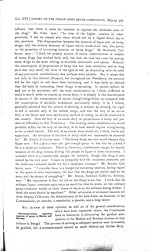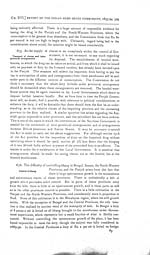Medicine - Drugs > Report of the Indian Hemp Drugs Commission, 1894-1895 > Volume I
(362) Page 328
Download files
Individual page:
Thumbnail gallery: Grid view | List view

328 REPORT OF THE INDIAN HEMP DRUGS COMMISSION, 1893-94. [CH. XVI.
The present is the time
for this measure, while consumption of ganja is still
believed by the authorities to be very limited. It cannot but be
the case that the
enormous difference between the taxation of liquor and ganja is an
incen-
tive to the increase in the drug habit, and such an inconsistency
between the
arrangements of different provinces and the administration of the
excise on dif-
ferent kinds of intoxicants cannot, in their opinion, be any longer
maintained.
Berar.
672. In Berar the
foundation has already been laid for the introduction of
a
system of control in respect
of ganja similar to that
advocated by the Commission. Cultivation is
already restricted and an acreage duty imposed on its growth. The
Commis-
sion are not aware of the conditions under which this has been
found possible.
The law of the province stands on a special footing, as previously
explained.
The Commission believe that there will be no difficulty, and there
certainly will
be some advantage in assimilating the system to that which exists
in the Central
Provinces, and which may ultimately be adopted in Bombay. Ganja is
inade-
quately taxed, and it is unlikely that the pitch of taxation
necessary to restrict
the consumption can be reached otherwise than by a direct duty, or
that a much
heavier acreage duty will effect the desired object.
Ajmere, Coorg, and Quetta-Peshin.
673. Not much need be
said of the other minor administrations. Progress
in Ajmere must depend upon
co-operation with the
British system in surrounding States. Ultimately
it is probable that the system can be assimilated to that in force
in the rest of
British India. In Coorg the price of ganja is very low owing to the
facility of
obtaining a supply from the Madras Presidency. When the system of
the latter
is revised, care should be taken that similar restrictions in Coorg
are not wanting.
Quetta-Peshin hardly requires special notice. The consumption of
ganja must
be very small, if it exists at all, as the sources of supply are
very distant.
The retail price stated to prevail is higher than anywhere else in
India except
Bengal and Assam.
Taxation of charas.
674. As the only province
which receives large imports of charas, the Pun-
jab is primarily concerned with the administration
of this drug. Hitherto there has been no taxation
of charas in the Punjab beyond the levy of license fees for its
vend. It is not
used in Assam, Madras, Berar, and Coorg, and but little in Bengal,
the
Central Provinces, and Bombay. It is used in the Punjab, the
North-Western
Provinces, Sind, and Quetta-Peshin. Bengal levies a duty of Rs. 8
per sér on
the small amount imported, and the Central Provinces Rs. 10 per
maund. In
Bengal, Mr. Gupta says that it will be necessary ere long to raise
the duty. The
import duty in Bombay is 8 annas per maund. In the other provinces
the only
tax is, as in the Punjab, that which is represented by the license
fees for vend.
Bengal is, therefore, the only province where the taxation is
adequate. In the
North-Western Provinces it is proposed to levy a duty of Rs. 80 to
Rs. 100 per
maund on all charas imported. In the Punjab, in pursuance of the
provisions of
Act X of 1893, a duty of Rs. 20 per maund has been proposed. This
appears very
small. The conditions under which the trade in charas from Yarkand
is carried
on operate to some extent against more severe taxation. But if
provision is
made to prevent the tax from being demanded from the actual
importers, the
Commission are of opinion that there is ample room for taxation
without the trade
Set display mode to: Large image | Zoom image | Transcription
Images and transcriptions on this page, including medium image downloads, may be used under the Creative Commons Attribution 4.0 International Licence unless otherwise stated. ![]()
| India Papers > Medicine - Drugs > Report of the Indian Hemp Drugs Commission, 1894-1895 > Volume I > (362) Page 328 |
|---|
| Permanent URL | https://digital.nls.uk/74574790 |
|---|---|
| Description | Chapter XVI, cont. |
| Description | [Volume 1]: Report. |
|---|---|
| Attribution and copyright: |
|




